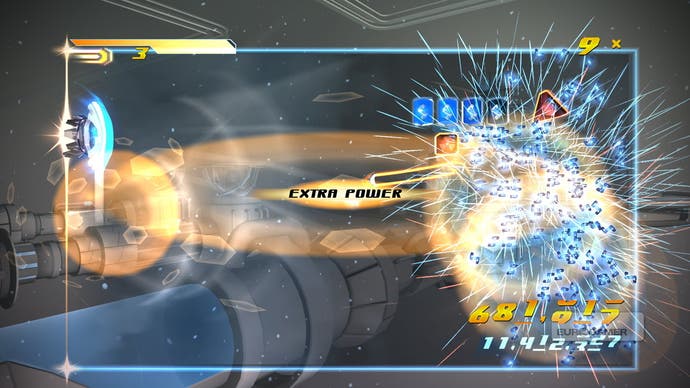Shatter
Block-rocking bats.
Ignoring the attempt - so perfunctory and stupid it's almost sweet - to give this entirely abstract arcade game some kind of plot, Shatter offers 10 worlds, each a sequence of rooms culminating in a boss. The rooms are sometimes squarish, with the bat sitting traditionally at the bottom; sometimes oblong, logically using the full spread of widescreen, with the bat on the left; and sometimes circular, walled about two-thirds of the way round with the bat at the bottom. The variety keeps you on your toes, although bounces can be mind-bendingly hard to work out in the circular rooms (which is the point, surely), and it's sometimes too easy to keep the ball permanently in play in the deep horizontal rooms just by blowing it away from you.
Blocks leave clouds of shards behind, which can be sucked towards you (when this won't send the ball somewhere you don't want it to go) for a score multiplier and to charge up your power gauge. Power can be unleashed in a "shardstorm", a sort of laser barrage from your bat than can be used to clear swathes of blocks at a time. It can also be used up to shield your bat from falling blocks, important in later stages - getting hit doesn't lose lives, but it takes the bat out of play for a second which is often long enough to miss the ball, and that does lose you a life.
Blocks drop power-ups fairly frequently. 1-ups are generously plentiful: with three continues available too, progress is pretty easy in Shatter until the final two worlds, which shortens the experience a little but keeps frustration low and focuses the mind on improving performance rather than survival. There are score, shard and power multipliers too, and two simple but desirable ball power-ups. Unstoppaball cuts through most blocks rather than bouncing off them, and Manoeuvraball is much easier to steer by sucking and blowing, a real boon in boss stages. Extra balls aren't a power-up, they're a choice, released at the cost of a life, with a big benefit to score if you can keep them in play.
It's all beautifully balanced and clear. Sidhe deserves credit for keeping the power-ups simple and useful, rather than flooding the game with hit-or-miss novelties. The designers have quite rightly poured their invention into the block types and room designs instead.

There are simple blocks, blocks that explode, blocks that weaken their neighbours when hit, blocks that drop when released by the destruction of anchor blocks, blocks that shoot off like rockets, blocks that suck and blow, blocks that work like hinges and pulleys. Sidhe takes the impish invention of Taito's layouts in Arkanoid and runs with it, constructing animated Heath Robinson cascades of cause and effect, just waiting to be spun into slow-mo, low-gravity chaos by your ball. It's beautiful, and new ideas keep coming all the way through. The bosses are brilliant too, devious and delightful enough not to be spoiled here.
If Shatter slips up anywhere, it's in its scoring. There's just a bit too much going on, the rules aren't transparent or consistent enough, and since the score multiplier is linked to hits off your bat as well as shard collection, it seems to reward playing without using the game's most interesting and skilful feature - the ability to suck and blow. The fact that the multiplier resets to zero at the start of each room constantly robs Shatter of the heart-in-mouth momentum that makes for the best score attack games, and the will to compete with your friends' scores - whether in the world, mode, boss rush or bonus categories - soon ebbs away.
In the end, Shatter is an engrossing, smart, beautifully conceived and executed arcade game, but it doesn't quite have the score-racking purity of purpose that makes a Geometry Wars, Pac-Man CE or Out Run Online Arcade so endlessly compelling. Once you've beaten it, which won't take long, you'll move on - but it's a blissful spell while it lasts, an absolute steal at £4.79, and a definite feather in PSN's cap. And you can always boot it up again just to listen to the music.
